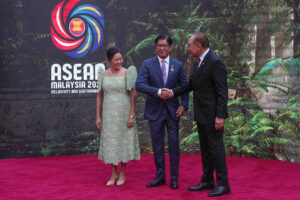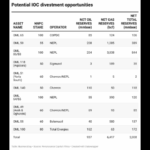
By Chloe Marie A Hufana, reporter
KUALA LUMPUR – The Philippines expects stronger regional trade and investment flows as two key trade agreements – the Association of Southeast Asian Nations (ASEAN)-China Free Trade Area (ACFTA) 3.0 Upgrade and the Second Protocol to Amend the ASEAN Goods Trade Agreement (ATIGA) – promise to modernize economic cooperation in the regional bloc.
At a news briefing here on Sunday, Palace Press ofFIser Clarissa A. Castro quoted Frederick D. Go, Special Assistant to the President for Investment and Economic Affairs, as saying that the ATIGA upgrade will keep the intra-ASEAN trade agreement relevant amid evolving global trade conditions.
“The enhanced agreement offers significant benefits, particularly “Improving trade facilitation measures, including transparency provisions, dispute settlement mechanisms and new and emerging trade elements,” she said.
The amended ATIGA was signed by Trade Secretary Ma. Christina A. Roque was handed over on Saturday and to ASEAN leaders on Sunday.
Ms Castro said the new provisions, including mutual recognition of authorized economic operators, will allow certified merchants to faster Cargo clearance throughout ASEAN.
The agreement also promotes self-declaration of origin, electronic certification (e-Form B) and acceptance of digital documentation, making cross-border trade easier for Philippine businesses.
“Businesses will find it easier to comply with administrative requirements for self-declaration of origin, implementation of electronic Certificate of Origin (e-Form D) and acceptance of digital documentation,” Ms Castro said.
Meanwhile, the Philippines and Canada aim to conclude free trade agreement talks by 2026, vowing to accelerate talks after a bilateral meeting in 2026.th President Ferdinand R. ASEAN summit between Marcos, Jr. and Canadian Prime Minister Mark Joseph Carney.
He talked about efforts to deepen the trade relationship worth more than $3 billion, covering manufacturing, defense and both conventional and clean energy sectors.
In a separate statement, Mr. Carney outlined Canada's strategy to double its non-U.S. exports over the next decade, positioning Southeast Asia as a key partner in that effort.
Canada and the Philippines agreed to expedite negotiations on a bilateral free trade agreement with the goal of completing talks by 2026.
He also committed to pursuing a comprehensive Canada-ASEAN Free Trade Agreement, which he aims to conclude during the Philippines' ASEAN Chairmanship in the same year.
The two leaders also welcomed the possibility of a bilateral visit “at the earliest opportunity” and agreed to maintain close coordination as both countries seek to expand trade and investment cooperation.
Meanwhile, Ms Castro said the ACFTA 3.0 upgrade would make the ASEAN-China partnership “more modern, more comprehensive and better aligned with today's global realities.”
Citing Foreign Affairs Secretary Ma. Theresa P. Lazaro, Ms Castro, said the revised framework will deepen cooperation in digital and green economies, enhance sustainable supply-chain connectivity and promote the empowerment of micro, small and medium enterprises (MSMEs) within regional value chains.
The ACFTA 3.0 upgrade expands the original agreement, which was signed in 2002, to include provisions on competition, consumer protection, the digital economy, the green economy and supply-chain connectivity in addition to trade in goods, customs procedures and investment cooperation.
The agreement with China was ASEAN's first FTA outside the bloc and remains one of the bloc's most important partnerships.
Beijing is the bloc's largest trading partner since 2019, reaching $507.9 billion in 2019, according to ASEAN's website.
The ASEAN-China FTA in 2005 quadrupled trade between the two.
Rafael J., ASEAN Studies Lecturer at De La Salle-College of Saint Benilde Josue. Cortez said the upcoming signing of the ACFTA 3.0 upgrade underscores ASEAN's commitment to strengthening ties with major global powers, while ensuring that its economies remain adaptable and competitive.
He said the enhanced agreement reflects the bloc's readiness to address global trade challenges, green transition and sustainable development – priorities shared with key partners such as China, the US and the EU.
“With China showing greater commitment to embracing green prosperity, we can expect this partnership to signal deeper ties between the 11-nation membership and Beijing not only on technology transfer, but also on how we can effectively advance the green transition together,” he said via Facebook Messenger.
“At the same time, in recognition of the integral role of MSMEs in strengthening Southeast Asian economies, this could also be a way for the region to gradually embrace digitalization, which is now the name of the game for conducting business.”










